Bailey’s Marathon For Mental Health: Full Interview
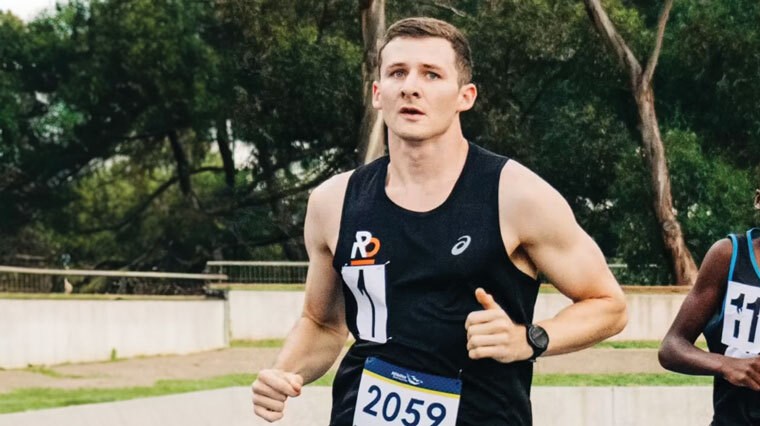
“If you are challenged by your mental health, then speak up, tell your story and realise it does not define you.” - Bailey Minchington
Please note: This article contains sensitive topics including depression and suicide. The content may be distressing or triggering for individuals who have experienced or are currently affected by mental illness.
Bailey Minchington is an avid runner, university student and personal trainer. He also has bipolar disorder – a lifelong mental health condition that can result in both debilitating depressive episodes and manic episodes that can lead to a frightening loss of control.
Both of these states can be life-threatening and require long-term management. Unfortunately, bipolar disorder is often misunderstood within the community. In his heart-felt and honest interview, Bailey bravely shares his inspiring story to help break the stigma.
For Bailey, at only 25 years old, bipolar disorder has led to multiple hospitalisations including a stage 3 traumatic brain injury and attempts at taking his own life.
On the road to recovery, both Bailey's support network and running have formed a powerful part of his mental toolkit to cultivate positivity and provide a healthy structure in his life. Combining his devotion as an advocate of mental health with his passion for running, on the 25th of August 2024, Bailey will be lacing up to run the Adelaide Marathon.
Bailey aspires to raise $5000 to support the Black Dog Institute and Bipolar Australia.
“I have a deep passion for spreading awareness for bipolar disorders, breaking any kind of stigma and helping as many others as possible who live with the condition to get the help they need and live the best lives they can.”
Check out Bailey's GoFundMe page to help make a genuine difference. No matter how big or small, your kind donation will go towards life-saving research and raising awareness of bipolar disorder and mental health.
Donate now to help raise life-saving funds for mental health
Alongside his inspiring mental health journey, in this interview Bailey shares his challenges, highlights and tips on marathon training – with a goal to run the epic 42.2km distance in under 3 hours.
Introduction, Running Background & Mental Health Journey
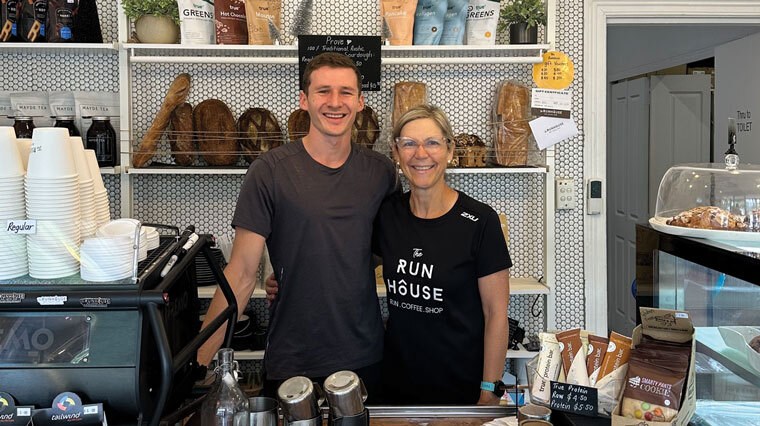
Bailey (left) and Helen Allnut (right), shop manager of The RunHôuse.
1. Who is Bailey Minchington?
Without sounding too much like a CV, I’d like to think that I am a highly motivated and optimistic person and have a love for being as organised as I possibly can. In doing so I love to fill my calendar and take on every opportunity that comes up (sometimes too many - my friends call this ‘going full Bailey’).
Currently I am studying the Bachelor in Clinical Exercise Physiology at University of South Australia, where I am an academic student representative and student ambassador for the program. I also assist in data collection for an exciting research study that involves participants running and volunteer in a variety of other spaces to try and get the most out of my time at university.
I strive to maintain a high GPA in my studies as I have future goals to pursue research of my own in a PhD followed by a career in the mental health sector. I work on a casual basis as an allied health therapy assistant at FlexCare, as a personal trainer at Xpress Personal Training and as part of the team slinging coffees and talking all things running in what feels like my second home - The RunHôuse.
I LOVE being around my friends and family, and my running crew out at RunAsOne who feel like a combination of the both. I have loved exercise and physical activity my whole life, ranging from club sports all through my junior years through to my love for running that kicked in a few years ago.
My running has really evolved since training with RunAsOne and having a program in place from Riley (coach) since last year (2023) that has already led to some huge PBs and lined up lots of exciting races for the year ahead.
On the flip side of life, I’ve had some pretty nasty injuries and surgeries in the past, ranging from neurosurgery to broken bones to scoliosis spinal fusion surgery to a stage 3 traumatic brain injury. Aside from all this, I have been challenged by severe mental illnesses in many different forms for most of my life.
The difficult journey around how to best treat this led up to early 2022 after a series of mental health episodes and a long battle with severe depression when I was diagnosed with Bipolar 1 disorder. It has not been until recently that I have been able to really get a grasp on how to understand and best manage my condition.
I can now confidently say that I have become content with who I am and living my absolute best life!
2. Why do you love to run? How has running helped support your mental health while living with bipolar disorder?
Running helps to provide structure to my life, keeps me well-grounded and allows me to always feel like I am achieving something. I think running is just as much about the physical aspect as it is about the community.
All of the people who I get to share my time running with are always so joyful and friendly, and I always seem to feel like we are on very similar wavelengths with the ways in which we go about life. Being able to keep a consistent running routine really helps to balance out the wild fluctuations in mood, energy and perception that come with bipolar disorders.
Some of the best ways to counterbalance those fluctuations is to most importantly maintain a healthy and consistent sleep routine, as well as eat well, stay away from alcohol (2 years and counting) and look after my body as best I can. I feel like a running routine really, really helps me to hit all of those markers.
Medication will play a crucial role in managing the condition for the rest of my life, but just as importantly, maintaining these habits are essential for my long-term health and happiness.
3. What does bipolar disorder feel like to you and how does it affect your daily life?
For a while there, especially in the months so close to my diagnosis and the series of events that happened prior, I held the belief that my condition completely defined me and would never allow me to achieve stability in the long-term.
Bipolar actually makes you feel pretty amazing when you are in a ‘manic’ state and none of the questionable decisions you make feel like they matter at all. One of the things that separates bipolar disorders from other mood disorders is that there isn't a need for any apparent triggers to lead to an episode of mania/depression. Unfortunately and very frustratingly, it can just happen at any time.
Then there is the ‘mixed mania’ phase where I experienced both the highs and lows somewhat concurrently. Having already been a relatively seasonal person in the past, I was hit with a whole new level of it when this came around. One second I would be completely captivated by someone and having what seemed like the best day of my life, and the next be spending the night in a mental health service centre and not thinking my life would ever amount to anything. And trust me when I say, experiencing this phase rattles the brain much more than you might think.
I have an immeasurable amount of gratitude for the medical team that has helped me to manage and move past the challenges that come with bipolar disorder and an acquired brain injury. The time and energy commitment to psychiatry, psychology, neuropsychology, occupational therapy, speech therapy, physiotherapy, neuro-ophthalmology and orthopaedic consultations have made all the difference in my recovery.
I thought people would always separate me as being "that guy with a mental illness/bipolar disorder", more so than bipolar just being a small part of me. There were periods where I was only just beginning to learn how to manage the condition and would allow the elevated states during episodes of mania to completely take over, such as when I went weeks without ever feeling like I needed to sleep, became consumed by grandiosity, had uncontrollable amounts of energy, spent large amounts of money on materialistic items and gifts without second thought and made all of these big plans for the rest of my life.
For example, all in just a couple of weeks, I applied for university with no preparation whatsoever, signed up to play a season of club football with absolutely no clue what I was doing and planned to run this marathon with only 10 weeks of training, whilst still carrying a broken ankle and recovering from various other serious injuries, on top of only just being diagnosed with bipolar (accompanied by the trial and error processes with new medications and all their side effects).
Coupling all this with an inconsistent and inexperienced history of running, as you could maybe guess led to a bone stress response injury and the inevitable and overwhelming flip side of bipolar depression, when all of my plans had to shift and it felt like my world came crashing down.
Bipolar depression is a type that often persists for months on end and to the severe extent that records troubling statistics where up to 60% of people with bipolar disorders attempt suicide at some point in their life, which happened in my life twice during mid-2021.
I can’t put into words how thankful I am about having not just become another statistic building on the mortality rate from suicide attempt, already being up to 30% higher for people with bipolar disorders than those in the general population.
I thank my family and close friends for all they have endured and for being there for me every step of the way. I cannot fathom what it must have been like for you but I am so glad to still be here on the other side and be able to share my life with you.
Carrying these memories will always be a challenge in being able to mentally refrain from ever going back to that mindset, but I am working hard every day on doing all of the right things that I can to keep myself as healthy as I can be.
Running To Raise Awareness Of Mental Health
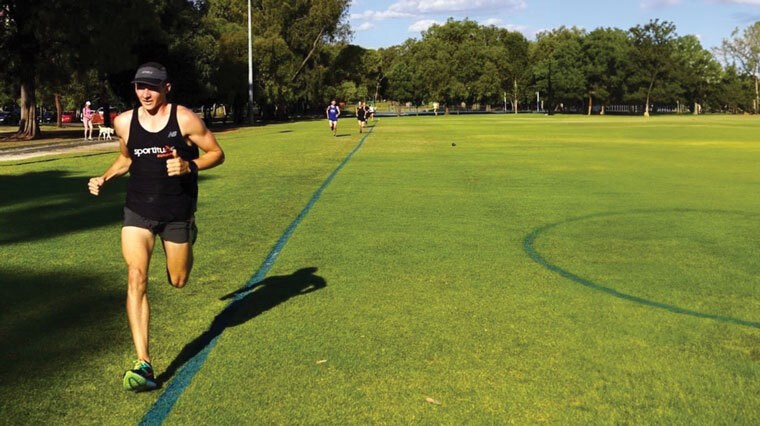
4. What does the life-changing work of The Black Dog Institute and Bipolar Australia mean to you?
As soon as I had made the plan to share my story and do something to spread awareness around bipolar disorders and mental illness, I went straight to Bipolar Australia. The team there do some incredible work in supporting all those affected by bipolar disorders, including people with the condition, their families and carers, mental health services and professionals alike.
The funds received would be directed toward spreading awareness for the condition, as well as allowing them to host their annual World Bipolar Day event in as many locations around Australia as possible.
I have a deep passion for spreading awareness for bipolar disorders, breaking any kind of stigma and helping as many others as possible who live with the condition to get the help they need and live the best lives they can.
In coming back to this fundraiser post-injury and feeling much more ready to go this time with a consistent block of training behind me, I wanted to begin to raise money for research after being inspired by the great things it can do through my experiences at university.
I hold a strong belief that Black Dog Institute will be a part of finding more accessible and effective treatment methods for various mental illnesses through the research projects they conduct.
For those who are in current need of support, there are a great number of incredible mental health organisations who help to change and save lives, although research can be equally as important to provide a better future for anyone who suffers the burden of mental illness, and to look at preventing the onset of mental illness for as many people as possible.
Donate now to support Bipolar Australia & the Black Dog Institute
5. What do you hope people will take away from learning about your mental health journey and by you running the Adelaide Marathon?
What I wish I had known at the beginning of my mental health journey is how much healthier I would be and how much progress I would be able to make in such short periods of time.
It is still a continuing process where there are many speed bumps along the way, but all are great learning curves that help me to better understand what mental illness is, and how I can use those lessons to adapt and build tolerance to any kind of relapse.
What I hope people can learn about what I am doing here is that; if you are challenged by your mental health, then speak up, tell your story and realise it does not define you.
Once you say something about it and be confident in who you are, everything gets so much easier and you play a part in breaking down the stigma around mental illnesses.
I know everyone's situation and battles are so different and it is easier said than done for just any challenging feat. But ultimately, through the journey it has taken me to get to this marathon and this stage in my life, I can say confidently that it has helped me to put all of my past challenges behind me, everything that I have endured.
I then use it as motivation and as a reminder to be disciplined and consistently work hard to achieve the goal that is something I have always wanted to do and do it with the absolute best effort that I can.
I originally just wanted to tick the box on the marathon because it sounded like an exciting idea that I had held on to for a number of years. But coming back to this, I thought I would push myself that extra level and commit to the training to get me to cross the line in under three hours.
Through this I’d be able to show people that; no matter how great a challenge is in life and how impossible recovery seems, even from the point where you are so unwell that you make the decision that life is not worth living any more, that full recovery is possible.
You can always push far beyond what you ever thought you were capable of and be happy in the process, whether you run or not; that is just the path that I took.
Building Resilience Together

Bailey (far left) with members of RunAsOne.
6. Can you share any challenges and how you overcame them, and highlights of your marathon training so far?
On the injury front I went deep into the pain cave right at the start when I was gearing up for the marathon back in 2022. As mentioned above, I had a bone stress response in my femoral neck, which I recovered well from for three months, to then have a manic episode around my birthday when I was still figuring out the right mix of medication.
I ran three intense sessions three days in a row after only running short and easy a few times a week. This inevitably flared up the injury again and set me back for another three months.
I got back into my training at the right volume after that, but running at a minimum of tempo pace for every run. I don’t know why, I was just so excited to be out there and still didn’t have a great idea of how to approach a running program, with also having terrible running form might I add. This saw me cop a pretty nasty case of shin splints that took me out for another three months.
I've definitely had my fair share of other running-related injuries over the past few years including synovitis in my ankle, tenosynovitis in my tibialis anterior, inflammation of my hip labrum, ITB syndrome, piriformis syndrome and Achilles tendonitis.
Then from February all the way through to September last year (2023) I battled with a very annoying case of knee effusion (excess fluid build-up in the joint) that had me sidelined again after I had put off getting it seen for much longer than I should have (get your niggles sorted early!). Although not exactly painful, I felt like my knee was jelly when I began to run.
I send thanks to SPARC (Sports and Arthritis Clinic) for helping me get to the bottom of what was going on and to Riley for helping me work on my strength and form to save the need for any pricey injections and get me back running again. Riley helped build me up from a flat Strava graph through to two easy 5km runs a week and up to a consistent 5-day-a-week routine to build towards the Victor Harbour half marathon in December. There I set a huge PB and got a big confidence boost heading into a year of more training and racing.
Highlights of my marathon training so far have included getting on the track over summer. I set huge PBs in the 3000m and 5000m, followed by another PB at the McLaren Vale Marathon Festival in the 10km and at the Barossa Marathon Festival racing the 5km on the road. I shaved another 27 seconds off of my PB and picked up 4th place overall.
To be honest though, heading out for Sunday long runs are definitely my favourite parts of the training block. I’ve been able to have a lot of fun in the structured long runs and love just having a good chat with my training partners, who are all now great friends of mine, as we tick over the kilometres and debrief over coffee at The RunHôuse after. Thank you to all of those people who have been a part of this with me - you know who you are!
7. How has running as a group such as with RunAsOne helped support your running and mental health journey?
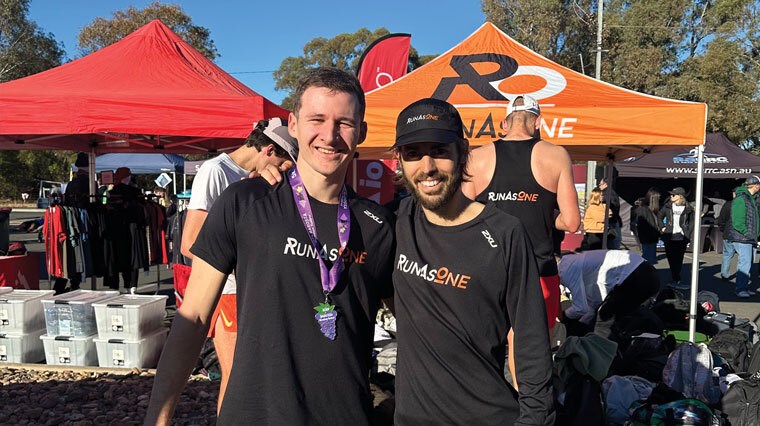
Bailey (left) and RunAsOne co-founder and coach Riley Cocks (right).
Heading out with the RunAsOne group every Tuesday and Friday has completely changed the game with my training. The whole community, the group I train with and all of the sessions that Riley and the team put together so that everyone out there can get the most out of their training is something that I am so grateful to be a part of.
Riley and Izzi, Helen and the whole team over at The RunHôuse, have had my back right from the beginning when I started as a part of the team at The RunHôuse a week or so after it opened back in July 2022.
Things were still pretty fresh for me post-diagnosis and they supported me then and have continued to through every single one of the challenges I have had with my mental health along the way, and just about everything in life for that matter.
In the past I have always been very, very challenged being in big groups of people, particularly in a social setting. It is a very common comorbidity with anxiety disorders and bipolar disorders, but the community at RunAsOne have always made me feel so comfortable and welcomed, and I love to be around them regardless of the state of mind I am in.
Bailey's Marathon Training Tips
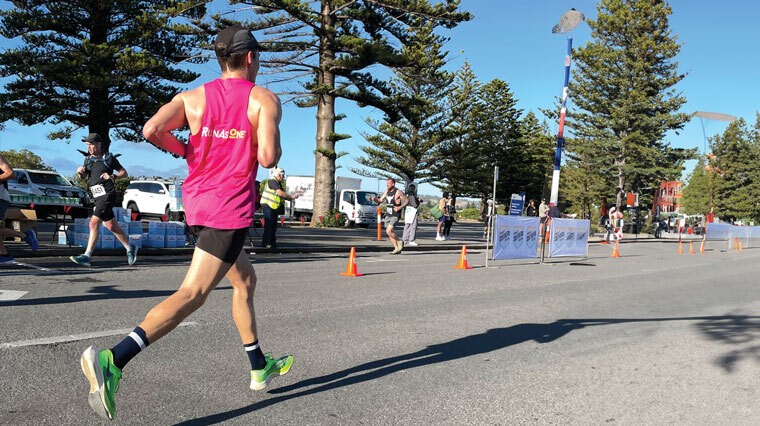
8. What are your top tips for juggling marathon training with work/study and social/everyday life?
I thrive off of routine, so I make sure that I plan things to allow for me to have routine and structure to my weeks and always give myself time to run.
I opt to run very first thing in the morning. Off the back of some big days at work, the study load piling up and having done a strength session the night before with the cold weather settling in, it is definitely not always that enticing, but I try to just show up and get it done no matter how I feel.
I tell myself that if I learn to say no one time then it becomes okay to just say that every other time, and then the downward spiral begins.
I don’t always listen to my body as well as I should, but I have learnt in this training block and juggling other things in life that I am capable of so much more than what I thought was possible.
I know that this sounds very stereotypical and a bit cliché but it has just taken discipline, putting in the hard work and believing in myself.
Sessions with the RunAsOne group keep me very honest and really help me to get out of bed and put in the hard work. All of those extra little bits and pieces have helped me take my running to the next level and get myself far beyond the condition I had ever thought I was capable of getting to.
The exciting thing is that I haven't really managed to plateau yet in this good stint of running post-injury, so I am really excited to see where it takes me.
Ultimately, my best tip to juggling marathon training with the rest of a very full life is to just get a healthy routine in place and find a group to train with!
9. What does your marathon preparation look like in terms of nutrition, training, recovery and races leading up to the event?
Nutrition & Gear:
Because I try to run very first thing in the morning, anything above 40 minutes, I will always get some sort of fuel in (white sourdough toast with honey is my go-to). Precision Gels get me through all my long runs, followed by my world famous smoothie (RunAsOne-ers will have seen this many times) and an almond croissant at The RunHôuse after.
Race day will see me go again for the white toast with honey option on the menu 2-3 hours before I head to the race sipping on a Koda Electrolyte mix to then have a Precision Energy Chew roughly 30 minutes before the gun goes off.
I love the accuracy and the insight that I get from my Garmin Forerunner 965 watch paired with the Garmin HRM Pro heart rate strap to look at all the finer details (I am obsessed with data and statistics; those who have seen all my spreadsheets will know what I’m talking about). I mix up the rotation between Feetures running socks and Oat socks and will always get a PREPD Prime in the night before a race or any longer long runs.
With winter settling in I opt for the Nike Dri-Fit lightweight running arm sleeves and 2XU run gloves to keep me warm.
Strength Training:
I run six days a week and combine that with two strength sessions, then have a little bit of time on the bike going to and from university. Having a background as a PT (personal trainer) and studying exercise physiology has really helped me to learn how to get the most out of my strength sessions.
I love to train in a circuit format to keep the sessions short, sharp and shiny (standard response of being time poor). As you could imagine the training is primarily focusing on lower body movements targeting all of the important muscles for running to keep them strong and prevent any more injuries from coming about.
I also make sure to regularly strengthen my core and include some upper body exercises to help with mobility, posture and just keeping my body healthy overall.
Recovery:
In terms of recovery, I focus on the foundations: eating well, hydrating and most importantly, I make sure to control my sleep routine. This comes down to what I believe as sleep to be the single best tool for recovery and also what all the evidence says of it being ESSENTIAL to managing bipolar disorders.
Sleep deprivation is one of the main triggers for manic episodes (and the inevitable flip side into the depressive state), so I have had to learn to be disciplined. I say no to pretty much all social events or any kind of commitment that happens after roughly 7pm, to make sure I can get an appropriate wind down routine in and get myself a good night's sleep ready to run the next morning.
Pre-Marathon Races:
Races leading up to the event started with the Adelaide Distance Series 5000m and 3000m on the track in January and February, where I cut a whole 1 minute off my PBs in both. They were followed by the McLaren Vale Marathon Festival 10km in April where I reduced my PB by 2 minutes (the elevation made that one very painful).
At the Barossa Marathon Festival 5km in May I cut another 27 seconds off my PB for the distance and hit a 1:17 PB for a road 5km.
Now I’m really starting to bump up the long runs and extend the duration of the Tuesday and Friday RunAsOne sessions to lead into the Gold Coast half marathon in early July, as my last race before tackling the full marathon at the Adelaide Marathon Festival in late August.
10. What does your current running shoe rotation look like? What shoes do you plan to wear on race day and why?
Easy days: New Balance Fresh Foam More v4 & Hoka Clifton 9
Sessions warm up/cool down: Saucony Triumph 20 (after a good stint as the long run shoe)
Sessions: New Balance FuelCell SuperComp Elite v3 & Nike ZoomX Vaporfly Next% v2
Wednesday long runs: Mizuno Neo Vista
Sunday long runs: Asics SuperBlast
Recovery shoe: OOFOS OOAHH Sport
Race day: Nike ZoomX Vaporfly Next% v2
Marathon shoe: New Balance FuelCell SuperComp Elite v4
I love a bit of cushion in a race/session shoe and have had a lot of fun wearing the New Balance FuelCell SuperComp Elite v3 in my training, so after hearing all the great reviews I tried on a pair.
I am now waiting until the next drop in July to head back into Sportitude and pick up the new colourway, giving me a good amount of time to train in them leading into the marathon.
Donate now to support Bailey and raise life-saving funds for mental health

You can learn more about Bailey's journey at Bailey's Marathon For Mental Health: Living With Bipolar Disorder.
Thank you Bailey for sharing your inspiring story. The Sportitude team wishes you the very best in your marathon training and fundraising goals.
Happy running!
Important Resources
If you are concerned about your mental health, are struggling or feel in crisis, please seek out the guidance of a healthcare professional (Health Direct can help you find one near you). Please talk to your trusted friends or family for support.





